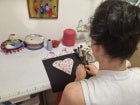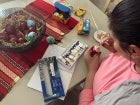Breadcrumb
Stories
Topic
- Show all (1276)
- Service delivery (-) (23)
- Civil society (-) (12)
- Women’s movements (-) (7)
- Ending violence against women and girls (72)
- Gender equality and women’s empowerment (45)
- Anti-violence interventions (41)
- Gender discrimination (38)
- Gender equality and inequality (38)
- Domestic violence/interpersonal violence (36)
- Access to justice and legal protection (33)
- Legal assistance (29)
- Laws, legislation (26)
- Gender-responsive budgeting (24)
- Primary prevention (24)
- Sexual harassment (24)
- Feminicide/femicide (23)
- Economic empowerment (22)
- Rape/sexual assault (21)
- Employment (20)
- Shelters (20)
- Rural women (19)
- Entrepreneurship (18)
- Decision-making (16)
- Youth (16)
- Gender power relations (15)
- Women’s rights (15)
- COVID-19 (14)
- Financing for gender equality (13)
- Gender mainstreaming (13)
- Gender, culture and society (12)
- Men and boys (masculinity) (12)
- Political empowerment (12)
- Access to basic services (11)
- Adolescents (11)
- Businesses and foundations (11)
- Girls (11)
- Human rights (11)
- UNiTE campaign (11)
- Beijing Platform for Action (10)
- Civil society participation (10)
- Peace and security (10)
- Safe Cities and Safe Public Spaces (10)
- Training (10)
- Women with disabilities (10)
- Convention on the Elimination of All Forms of Discrimination against Women (CEDAW) (9)
- Financial resources (9)
- Information and communications technology (ICT) (9)
- Leadership and political participation (9)
- National planning (9)
- Partnerships (9)
- Gender stereotypes (8)
- Governance (8)
- Innovation and technology (8)
- Institutional mechanisms (8)
- Peacebuilding (8)
- Social protection (8)
- Women farmers (8)
- Citizen engagement (7)
- Gender statistics (7)
- Generation Equality (7)
- Government contributors (7)
- Productive resources (7)
- Religion (7)
- Science and technology for development (7)
- Sports (7)
- Trafficking/sexual exploitation (7)
- 2030 Agenda for Sustainable Development (6)
- Child marriage (6)
- Communications and media (6)
- Electoral systems and processes (6)
- Lesbian, gay, bisexual, transgender, intersex (LGBT) rights (6)
- Markets (6)
- Political violence (6)
- Sex-disaggregated data (6)
- Sustainable Development Goals (SDGs) (6)
- Unpaid work (6)
- Accountability (5)
- Gender data production and collection (5)
- Governance and national planning (5)
- Rural development (5)
- Traditional media (5)
- Constitutions and legal reform (4)
- Gender data gaps (4)
- Gender data use and accessibility (4)
- Gender wage gap (4)
- Health (4)
- Intergovernmental processes (4)
- Land and property (4)
- New media (4)
- Poverty (4)
- Public administration (4)
- Rule of law (4)
- Schooling (4)
- Accountability in the UN system (3)
- Climate change (3)
- Crisis response and recovery (3)
- Education (3)
- Environmental protection (3)
- Gender equality indicators (3)
- Health care services (3)
- Inheritance rights (3)
- Living conditions (3)
- Media leadership (3)
- National mechanisms (3)
- National statistical systems (3)
- Parliamentary development (3)
- UN Security Council resolution 1325 (3)
- UN system coordination (3)
- Capacity development (2)
- Coordination, knowledge management (2)
- Disaster risk reduction (2)
- Food security (2)
- Fundamental freedoms (2)
- Fund for Gender Equality (2)
- Harmful practices (2)
- Humanitarian action (2)
- Human rights–based approach (2)
- Macroeconomic policies (2)
- Monitoring and evaluation (2)
- Planning and monitoring (2)
- Sexual and reproductive health and rights (2)
- UN Security Council resolutions (2)
- Urban development (2)
- Åsa Regnér, Deputy Executive Director for Policy, Programme, Civil Society and Intergovernmental Support (1)
- Children’s rights (1)
- Commission on the Status of Women (1)
- Executive Director (1)
- Financial and economic crisis (1)
- Green economy (1)
- Literacy (1)
- Local development (1)
- Maternal health (1)
- Migration (1)
- Monitoring, evaluation and reporting (1)
- Peace processes (1)
- Public sector reform (1)
- Sexuality (1)
- Temporary special measures, affirmative action (1)
- UN Trust Fund to End Violence against Women (1)
Region
Country
1 - 20 of 37 Results
Pagination
Date:
Women in Albania are key drivers of social and economic progress, yet they remain underrepresented in political leadership. To bridge this gap, UN Women Albania, with support from the Swedish Government, trained over 130 women and girls across the country, equipping them with the skills and networks needed to step into leadership roles.
Date:
The May 11, 2025, elections are a key moment to strengthen democracy and build on Albania’s progress in women’s political leadership. While the country ranks 44th globally for women in Parliament, sustaining these gains requires ongoing efforts to ensure participation and prevent setbacks.
Date:
UN Women Albania, in partnership with the Government, civil society, international partners, and UN agencies, marked this year’s 16 Days of Activism Against GBV under the theme #NoExcuse – UNiTE to End Violence Against Women and Girls. Activities included awareness campaigns, exhibitions, an award ceremony, youth initiatives, and private sector collaborations.
Date:
United Nations Agencies in Albania, alongside government institutions, civil society, and citizens, kick off the 16 days of activism against gender-based violence under the theme #NoExcuse – Unite to End Violence Against Women and Girls.
Date:
Through the UN Joint Programme and UN Women’s intervention, nearly 500 women and children received support with healthcare, legal aid, counseling, vocational training, and housing, resulting in 69 women securing employment and over 250 families receiving rental assistance in Albania.
Date:
From 23 to 25 September, UN Women Europe and Central Asia Regional Director, Belen Sanz Luque, and the Deputy Regional Director, Elisa Fernandez Saenz conducted their first visit to Tirana to participate in the Beijing+30 International Conference and meet government representatives and funding partners in the country.
Date:
10 September 2024 – UN Women in Albania organized in September a five-day Training of Trainers focused on women’s active participation in politics. 14 accomplished trainers were certified on political leadership and candidate training.
Date:
UN agencies, national and international partners, visit North Albania to assess progress of the UN Joint Programme on Ending Violence Against Women.
Date:
On International Women’s Day, the People’s Advocate in cooperation with UN Women launched the ‘Femicide Watch’. This first of its kind initiative will collect and analyze data at the national level to promote more effective policies and mechanisms to prevent gender-based killings of women.
Date:
How a women’s rights organization and the National Employment and Skills Agency in Albania are joining forces to support women survivors of violence integrate in the job market.
Date:
They are asking for increased long-term, sustainable investments from government, private sector, foundations, and other donors to prevent violence against women and girls.
Date:
In a dedicated effort to promote gender equality and eliminate all forms of discrimination against women, Albania is preparing for its fifth report to the Committee on the Elimination of All Forms of Discrimination Against Women (CEDAW), scheduled for October 18, 2023.
Date:
A two-day workshop on gender participatory budgeting and community outreach practices brought together civil society organizations, local government representatives, activists, and gender-responsive budgeting experts from Albania and North Macedonia.
Date:
After six years of dedicated work, the UN Women regional programme Ending Violence Against Women and Girls in the Western Balkans and Turkyie “Implementing Norms, Changing Minds” comes to a close. Civil society organizations, government representatives and partners met to take stock of achievements, challenges, and the way forward.
Date:
In the last two years, thanks to support from the European Union-funded regional programme on ending violence against women “Implementing Norms, Changing Minds,” more than 3,000 women survivors have used the helpline for information, referrals and reporting – 900 of whom further obtained free legal aid and psychosocial counselling as well as referrals to more specialized support services.
Date:
Supported by a small grant from the UN Trust Fund, the Center "Shelter Edlira Haxhiymeri", in close partnership with the Streha Center for LBT women survivors of domestic violence, runs a project to end violence against women and girls in four remote areas of Albania.
Date:
Around 20 journalists and media experts joined the media forum on "Media and Violence Against Women in Politics and Elections" organized prior to Albania’s Local Elections taking place on the 14th of May, by UN Women and its partner organization "Together for Life". Participants in the event discussed the various challenges faced by women in politics and elections and the crucial role of the media in addressing them.
Date:
Verie Tahiraj is a strong and determined woman, who has been supporting her family through economic hardship for years. When the opportunity to secure a source of income by becoming a part of the artisan value chain presented itself, she seized it without hesitation.
Date:
A week-long events tackle gender discrimination in Albania with participants asking for equal representation in every space.
Date:
Interview with Michele Ribotta, Head of the UN Gender Group and UN Women Representative in Albania
1 - 20 of 37 Results



















